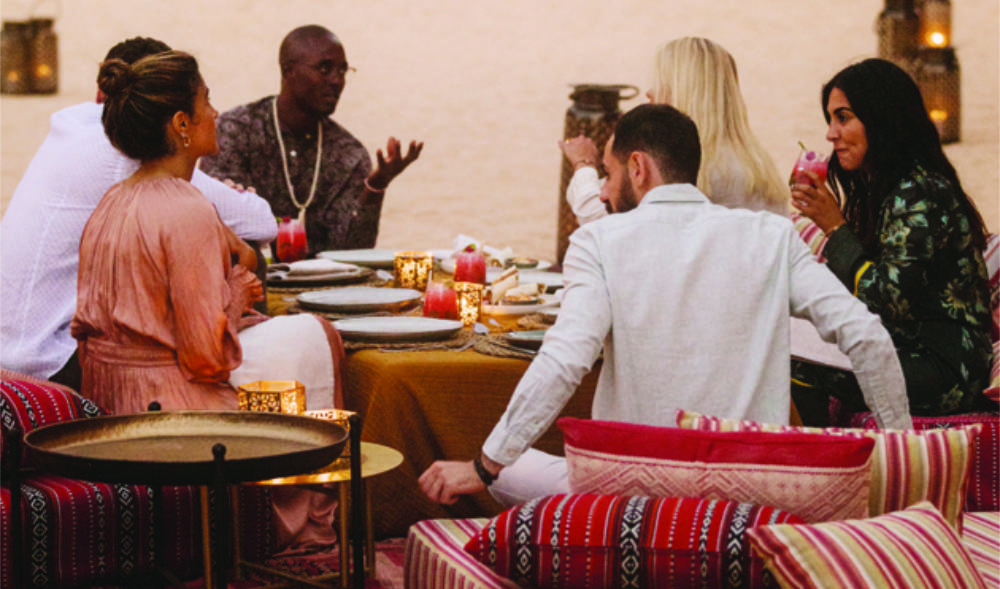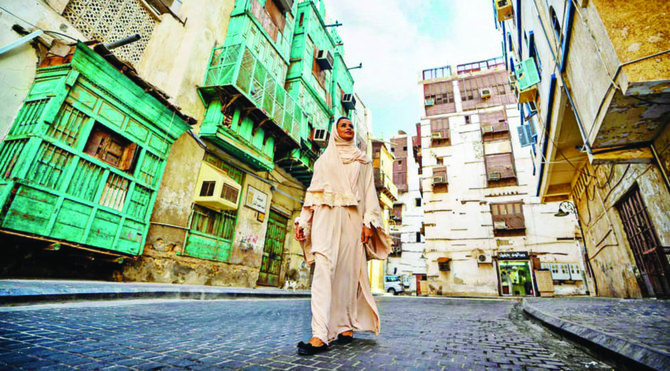JEDDAH: For the first time in two years, Ramadan’s sights and sounds are providing foreign tourists glimpses of the rich culture of the Kingdom, a fitting prelude to an expected influx of travelers seeking to experience the country’s widening array of attractions.
To support the cultural tourism sector, a tourist visa was launched in September 2019 for citizens of over 50 countries. However, the onset of the Covid-19 pandemic in early 2020 ended all international travel.
This Ramadan has now become an opportunity to welcome travelers using the tourist visa. Although the holy month sees businesses operate at reduced or altered hours, the Kingdom has organized several events for foreign tourists to experience Muslim-Saudi culture.
Arab News recently interviewed Abdullah Asiri, a tour guide in Jeddah’s old historic district, a UNESCO World Heritage Site, who had been taking Spanish tourists through the Al-Balad alleyways.
“Saudi Arabia is very rich in historical and natural attractions and unique adventures. The ease of traveling from one domestic airport to another is impressive, (so) tourists can visit more than one region while they are in the Kingdom,” Asiri said.
Saudi Arabia is very rich in historical and natural attractions and unique adventures. The ease of traveling from one domestic airport to another is impressive, (so) tourists can visit more than one region while they are in the Kingdom.
Abdullah Asiri, Tour guide
There are several sites around the country open to tourists including Diriyah in Riyadh and Rijal Alma in Asir. Sightseers can also visit the deserts of Neom, fishing spots in Jazan, the mountains of Abha, and the ancient city of AlUla in Madinah.
The concept of cultural tourism relies heavily on people moving about. This allows them to make contact with people and their stories, eat local food, and experience various types of art, including dancing.
Asiri, who is also a flight attendant with Saudi Airlines, said he decided to operate as a tour guide because his travels around the world made him realize how passionate some people are to experience new cultures.
HIGHLIGHT
Speaking of cultural tourism during the holy month, Abdullah Asiri explained how Ramadan nights, Al-Balad attractions, and the celebratory iftar and sahoor meals that include an array of traditional Saudi dishes are ‘worth it’ according to foreign tourists.
He said that there has been a significant influx of tourists in Al-Balad in the wake of the Kingdom lifting its travel ban and making it easier to get a visa.
“Many of the tourists I met after (the ban was lifted) told me about how excited they were to visit many of the Kingdom’s sites that we locals would never think of (doing).”
Speaking of cultural tourism during the holy Month, Asiri explained how Ramadan nights, Al-Balad attractions, and the celebratory iftar and sahoor meals that include an array of traditional Saudi dishes are “worth it” according to foreign tourists.
“One of the members in the group expressed how worried she was about visiting the Kingdom during Ramadan since most of the activities begin at night. However, once she saw the amazing Ramadan nights, tents, and local food booths she changed her mind and was impressed by everything she experienced and explored during the night shift tour,” he said.
Asiri advises foreign tourists to experience the sunset at the Jeddah Corniche and visit museums in the afternoon so they can enjoy Al-Balad in the evening after 8 p.m.
Another worthwhile place to visit is AlUla, touted as one of the world’s largest open museums, with a 200,000-year history of human habitation. It has now become a crossroads for culture, art and heritage, in addition to daytime outdoor activities for health and wellness enthusiasts, from April 2 to May 7.
The official account for AlUla festivals and events @AlUlaMoments tweeted on April 20:
“Whether fasting or relaxing this #RamadanInAlUla, experience the breathtaking #UNESCO site of #Hegra. Adventure on bicycles or cruise in a vintage Land Rover; check out the Handcraft Pavilion & explore this heritage site at your own pace.”
Tourists can celebrate the holy month among the city’s ancient landscapes and natural beauties, and enjoy an iftar and sahoor in AlUla’s newest restaurants.
Earlier this month, the Saudi Council of Ministers agreed to launch chapters of the Tourism Development Council in all the regions, which seeks to coordinate the actions of government agencies.
The tourism council’s aim is to fulfil the objectives of the national tourism strategy, develop destinations, upgrade hospitality facilities, and attract investment.




































